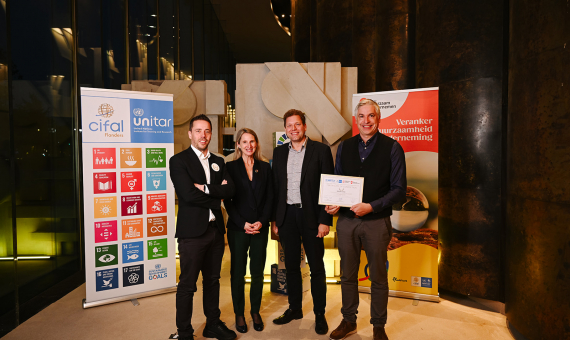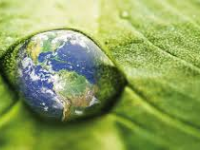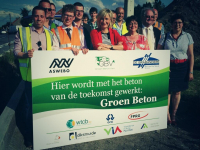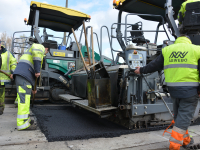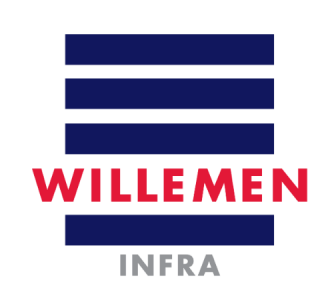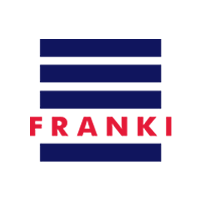We endorse the agenda of the United Nations Sustainable Development Goals, which provides a framework of 17 goals to which businesses, governments and citizens can contribute. In addition, we are taking actions today to prepare for the European Green Deal and the shift to a more circular economy. Based on our business operations and the achievements of the companies in our Group, we will continue to prove, year after year, that we take this commitment seriously.
Our commitments are a direct result of good management and of our purpose but are also formulated in response to a number of trends and risks, including (non-exhaustive list):
- Climate change and resource scarcity
- The European Green Deal
- CO2 taxation is no longer a distant prospect
- Sustainability reporting regulations
- Corporate Social Responsibility Directive starting in 2023
- Circular materials and construction methods
- Industrialisation in the construction sector
- The changing demands of our customers
- Changing expectations of stakeholders (including banks) and current and future employees
- Stricter tenders in which sustainability aspects and a TCO approach are playing an ever more prominent role.
- Changing demographics and urbanisation
Willemen Groep aims to be the preferred partner – a partner that realises future-oriented infrastructure works, projects and buildings in an efficient and climate-conscious manner with consideration for people and society. We have designed our sustainable strategy around these three focus points:
EFFICIËNT AND FUTURE-ORIENTED CONSTRUCTION CLIMATE ACTION AND SUSTAINABILITY PEOPLE AND SOCIETY
The SDGs in a nutshell
The Sustainable Development Goals (SDGs) are a global sustainable development agenda to which citizens, businesses and governments can jointly contribute. They are a global compass for taking on challenges such as poverty, education and the climate crisis. These goals revolve around the whole of society.
The SDGs were drafted by the United Nations in 2015. The agenda points should be achieved by 2030. The SDGs consist of 17 goals and 169 underlying targets for the purpose of operationalising these goals. It is up to Member States to ensure their translation into national policies.
Willemen Groep can have a positive impact on several of these 17 SDGs, and our aim is to strengthen this positive impact to the maximum. For other SDGs, we must focus on reducing our negative impact.
Our priority SDGs are:
- 3. Good health and well-being
- 6. Clean water and sanitation
- 7. Affordable and clean energy
- 8. Decent work and economic growth
- 9. Industry, innovation and infrastructure
- 11. Sustainable cities and communities
- 12. Responsible consumption and production
- 13. Climate action
- 15. Life on land
- 17. Partnerships for the goals
From SDG Pioneer to SDG Champion
Our board has undertaken to continuously improve its environmental care programme in accordance with ISO 14001, the CO2 Performance Ladder, and the VOKA Sustainable Entrepreneurship Charter. The VCDO charter, awarded by Voka, recognises companies' commitment to environmental, social engagement and economic viability sustainability.
In 2017, our Group was one of the first Belgian companies to sign the United Nations SGD charter. Three years later, in 2020, we obtained the UNITAR ‘SDG Pioneer’ certificate. This is a distinction we’re very proud of, but our ambitions stretch much further. That’s why we started the SDG Champion track in 2021. This goes one step further than SDG Pioneer.
Achieving the SDG Champion certificate highlights Willemen Groep's contribution to the United Nations' 17 Sustainable Development Goals (SDGs). In 2023, we achieved the UNITAR SDG Champion certificate, which strives for true transition and contributes with its sustainability policies to the systemic change needed to fulfil the 2030 Agenda for Sustainable Development. By renewing the VCDO certificate and achieving SDG Champion status, Willemen Groep confirms its leadership and commitment to sustainability.
CO2 REDUCTION
Construction project clients are making increasingly more demands in terms of sustainability – and rightly so. Identifying the carbon footprint is one of them. As one of the largest family construction groups in Belgium, we consider it our duty to contribute to a sustainable world. That’s why we calculate our carbon footprint on an annual basis, so we can set objectives that are in line with the European Green Deal.
CO2 Performance Ladder
The CO2 Performance Ladder is a CO2 management system that encourages businesses and public authorities to reduce their CO2 in a structural way, in their operations and in their projects and in their supply chains. In the Netherlands, the CO2 Performance Ladder, which consists of five levels, is used as a CO2 management system and as a procurement tool. Companies ranked up to and including Level 3 work on the CO2 emissions of their own organisation (and all their projects). To be ranked Level 4 or 5, a company must also take action in relation to the CO2 emissions in its supply chain and sector.
Kumpen was the first company in the group to successfully complete the level 5 certification process together with Bureau Veritas. This resulted in the award of the level 5 CO2-aware certificate according to the CO2 Performance Ladder handbook 3.1 in early 2022.
Willemen Infra started the certification process for level 4 in late 2021 and achieved this in early 2022. At the end of 2023, as a large company, they also achieved level 5 - the highest level.
Willemen Groep
Across the Group, a total of 40,488 tonnes of CO2 were emitted in scope 1 and 2 in 2023, which is 6,652 tonnes or 14% less than in 2019. This overview includes all Belgian companies in our Group.
Business Line Construction
BL Construction's ambition is to reduce its energy consumption, focusing specifically on reducing site consumption and the vehicle fleet. We aim to achieve a 20% CO2 reduction by the end of 2024 in relation to turnover and emissions in 2019.
This ambition is underpinned by specific sub-targets, namely reducing fuel consumption within the fleet by 15%. A 15% reduction in the use of operating assets, such as fuel oil, is also targeted. Electricity consumption in offices and yards was also reduced by almost 100% by 2023, resulting in a 6% reduction in the total CO2 footprint. Finally, a 75% reduction in business air travel is targeted.
Business Line Infra
BL Infra's ambition was to achieve a 10% CO2 reduction in relation to turnover by the end of 2022 compared to 2019 emissions. Among other things, they want to achieve this by switching to Belgian green power for the asphalt plants and all other activities, optimising the asphalt plants and logistics/mobility and renewing equipment by replacing power groups with fixed connections.
Various measures have been taken to achieve these goals. On the one hand, the energy supply was made more sustainable by switching to green electricity from Belgium and the existing power plants were compared with Best Available Techniques (BAT) studies. On the other hand, attention has been paid to sustainable infrastructure, such as the use of low-temperature asphalt and maximum insulation. The vehicle fleet was also made more sustainable by switching to electric and hybrid vehicles, and commuting distances, tyre pressure and eco-driving were taken into account.
For the chain fleet, construction sites and offices will use energy-efficient yard chains with better insulation and motion detectors on lighting. There will be an energy monitoring system for yards and installation of timers. The use of hybrid generators at power groups or as reinforcement of available grid power is being looked at. Finally, yards will be connected to grid power as much as possible.
By implementing these reduction measures, we can meet our sustainability goals and reduce our impact on the environment. We are proud to play our part in creating a more sustainable future and will continue to inform our stakeholders about our progress in this area.
MOBILITY
In 2023, we had 1,443 commercial vehicles within our Group: 744 passenger cars, 593 commercial vehicles and 106 trucks. We have developed a strategy and planning to make this fleet more fuel-efficient and thus more environmentally friendly. To this end, we are taking the following measures:
Greening fleet
Our employees who qualify for a company car have a choice of environmentally friendly vehicles, such as plug-in hybrid cars or fully electric cars. When determining the most suitable fuel type for an employee's company car, we look at a Total Cost of Ownership calculation and driving profile together with the driver. Meanwhile, 100% of the passenger car selection list consists of electric vehicles.
To encourage our employees to choose more green options, we expanded our charging station network in 2022. We now have 160 charging points spread across our various sites. We try to supply the electricity for these charging stations via solar panels whenever possible. Mobile charging stations are used on our sites. This allows our employees to charge their electric company cars while working on remote construction sites without a fixed charging point. We believe these measures will help reduce CO2 emissions and encourage sustainable mobility within our organisation.
Sustainable alternatives
We not only want to green our fleet, but also offer sustainable alternatives and strive to make our people's mobility as sustainable as possible. We actively encourage the use of bicycles. Employees who choose to leave their car at home and come to work by bicycle receive a bicycle-kilometre allowance, even if they already have a company car. In 2023, the bicycle infrastructure at our site in Kontich was renewed and expanded with accompanying facilities such as shower facilities and a completely new bicycle shed where charging points for electric bicycles are also provided.
We encourage carpooling and try to maximise the occupancy rate of our service vehicles. We have also included home working as a regular part of our way of working. We have established a policy to allow structural and occasional home working for eligible positions. Where possible, online meetings between people from different branches are also encouraged. All in all, this results in a lot less travel.
Raising awareness
We also regularly highlight sustainable mobility. Employees who chose a greener or alternative means of transport during this week had the chance to win a prize. We let them fill in a survey and a quiz, rewarded the best photos of alternative ways to get to work and gave great prizes to the people who travelled the most kilometres by bike or on foot. In our Safe Forward campaign - in which various road safety topics are highlighted via mailings - we also regularly give tips on how to drive more economically and keep consumption under control.
WASTE POLICY & CIRCULARITY
Reducing waste
We attach great importance to reducing waste and promoting a circular economy. One way we do this is by collecting waste materials at our sites and selectively sorting them. Although we have chosen to collect our waste materials as a mono-flow, sometimes it is not possible to selectively collect streams originating from a demolition, renovation and/or construction site. In these cases, the mixed stream is collected and taken to our waste processor. There, the mixed waste undergoes several sorting and processing steps to maximise material recycling.
To minimise CO2 emissions, containers of construction and demolition waste are always transported to a processing site as close to the site as possible. In addition, we use various techniques to obtain the purest possible end products, which means that we further process residual streams internally or otherwise and transport them to recognised processors or use them as secondary raw materials. To raise awareness among our construction and road workers of different nationalities, we have worked together with the sector association ADEB-VBA to develop uniform pictograms and clear sorting instructions for the various waste streams.
As waste collectors and producers, we have to comply with the VLAREMA 8 amendments, which aim to promote separate collection and recycling of a number of waste materials. Therefore, since 2021, we have been checking the purity of our monostreams (rubble, wood, metals, etc.) ourselves and helping our waste collectors check residual waste fractions for sorting errors and nonconformities.
Willemen Groep remains committed to a sustainable future and we willl continue to look for ways to reduce our waste streams and optimise our use of raw materials.
Out of Use
We have established a partnership with Out of Use as a solution for our IT material that no longer meets our requirements or is defective. Every year, old IT material is collected and sent by Out of Use to two charities: Natuurpunt to plant trees and Share-IT (ism Circular Brussels asbl) to donate reusable computers and smartphones to vulnerable people. The collection of our IT material in 2022 resulted in our employees and their families being invited by Out of Use and Natuurpunt to a tree-planting event in Putte on 27 November 2022. We are proud of this initiative and would like to continue contributing to a sustainable future.
Circular and sustainable production
As a construction company, we take our responsibility in preserving the environment and the health of the planet very seriously. That is why we are permanently committed to sustainable and circular production methods, always looking for innovative and environmentally friendly solutions.
When producing new asphalt, our ambition is to reuse up to 70% old asphalt. But we want to go even further and are currently working on producing asphalt that is 100% circular, with no more primary raw materials being used. We are also constantly working on optimisation in terms of raw materials and logistics. We aim to maximise the use of recycled materials such as asphalt granulate and secondary aggregates instead of primary raw materials. We also look for alternatives to bitumen and use software for better planning of logistics and transport of materials, increasingly using transport by water.
We also strive for sustainability and circularity in the production of road concrete. For instance, we use high-quality concrete granulate as an alternative to primary raw materials, and strive for alternatives to cement, such as geopolymer. In terms of water use, we are committed to maximum reuse and rainwater recovery to achieve zero discharge status.
The production of asphalt and concrete does have some impact on the environment. We try to reduce this impact as much as possible. To achieve this goal, we employ several strategies. For example, we want to improve the energy efficiency of our production processes by reducing the use of natural gas and fuel oil and replacing them with alternatives such as hydrogen and biofuels. In addition, we use AVT technology, which allows us to produce asphalt at lower temperatures. This not only reduces energy consumption, but also reduces greenhouse gas emissions.
We attach great importance to the quality of the end product and therefore set the principle that the recycled product must be at least equivalent to the product with primary raw materials. Our ultimate goal is climate-neutral construction without negative impact on ecosystems. We therefore analyse, evaluate and manage the environmental risks associated with our activities. We are strongly committed to the optimal use and management of raw materials, materials, financial resources and construction talent in order to minimise our impact on the environment and increase our contribution to a sustainable future.
WATER MANAGEMENT
We take our responsibility to improve groundwater levels in Belgium. We do this through actions on groundwater dewatering, but also through innovative product developments that reduce the negative impact of paving on groundwater.
COOCK project Groundwater management in construction projects
On a construction site, temporary drainage is often necessary to lower the groundwater level. This may be necessary to increase stability of dykes and embankments, to pump up groundwater, or to lower the water level in the bottom of the construction pit in such a way that dry work can be carried out when laying pipes and sewage pipes, building basements, underground car parks, etc.
The project Groundwater Management in Construction Projects, which runs from 1 January 2022 to 31 December 2024, aims to research and disseminate innovative methods and techniques based on the 3 axes of the Trias Aquatica. This project is led by Buildwise and carried out in cooperation with Embuild Flanders. We are involved in the COOCK project as a participating member.
The project focuses on optimising and minimising pumped groundwater flows through smart control and innovative techniques for hydraulically isolating construction pits, replenishing groundwater through return and infiltration techniques and facilitating the reuse of non-returned/infiltrated groundwater instead of discharging into the sewerage system.
COOCK project Water-conscious Construction
We also participate in the working group of the COOCK project Water-conscious Construction, which is being implemented by several organisations, including Embuild Flanders, - which takes the lead - Netwerk Architecten Vlaanderen (NAV), VLAKWA, VLARIO and Buildwise. The project will run from 1 March 2022 to 28 February 2024.
The project focuses on drought and flooding problems in Flanders. On the one hand, there is high water consumption in relation to the available water quantity due to the high population density. On the other hand, due to the high degree of paving, we drain precipitation at an accelerated rate and local infiltration is underused.
The aim of the project is to reduce both drinking water consumption and water discharge to our rivers. In this, the construction industry, and architects in particular, have an important role to play. The project focuses on rational water use and water conservation techniques, circular water use such as grey and black water reuse and collective collection and reuse of rainwater, and replenishing groundwater levels through, for example, collective infiltration of rainwater.
With these innovative methods and techniques, we can improve our water management and contribute to a sustainable future.
Drainphalt
Drainphalt® is an in-house development by Willemen Infra and product of our innovation competition. It is an open asphalt pavement that allows rainwater to drain directly into the subsoil or temporarily buffers it in the asphalt pavement. Thanks to this rapid drainage of rainwater, sewers, water trenches, drainage grates, buffer basins and canals are unnecessary. Drainphalt® thus represents a significant space saving on the site and is a concrete solution to the ever falling groundwater level.
The new asphalt mix is also turned at low temperature. This not only results in lower CO2 emissions during production, the asphalt also gives off less hot gases during placement, making it more pleasant to place. Last but not least, the new asphalt requires less maintenance.
The product has been further developed in recent years so that it can grow into a real system solution. Both in terms of composition and placement, optimisations were researched and tested in order to achieve a more qualitative end result. With Drainpipe, we added a lateral drainage system to drain the water into the underlayer. A collaboration with an external consortium was also initiated to offer Drainphalt® within a larger system solution on the market.
Join for Water
But we also want to make a difference outside the company walls. That is why we support ‘Join For Water’. Thanks to this NGO, tens of thousands of people annually get access to sustainable solutions for drinking water, sanitation and hygiene, or water for agriculture. Through Entrepreneurs for Entrepreneurs, we very concretely support a project in the catchment areas of the Mpanga and Semliki rivers in Uganda.
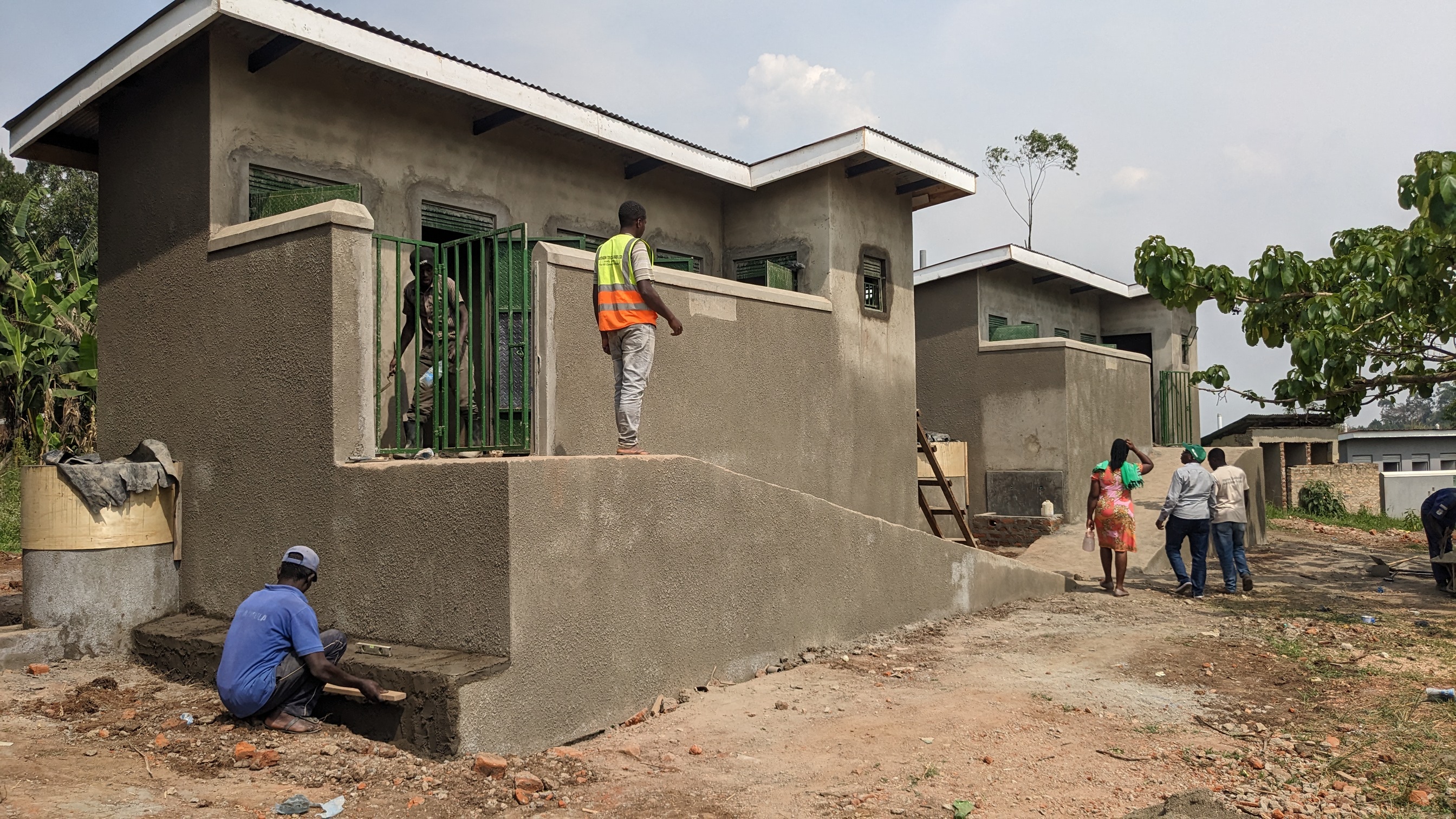
COOPERATION AND KNOWLEDGE-SHARING
Together, we achieve more. We engage in sector initiatives and put a lot of effort into sharing knowledge. With many other companies, we participate in the VOKA Charter Duurzaam Ondernemen (Sustainable Enterprise Charter), a multi-year process where companies learn from each other and from specialists how to achieve more sustainable operations.
Hydrogennet
We are an active member of the Hydrogen Industry Cluster (WIC). This is an industrial partnership in the field of hydrogen under the coordination of WaterstofNet. The network comprises mainly industrial players, a number of research institutions and some public organisations. It covers the entire hydrogen chain. The ultimate ambition is to bring together the strongest possible ecosystem of players active in hydrogen at Benelux level.
Green Deal Circular Building
Willemen Groep is one of the companies that participated in the Green Deal Circular Building in Belgium. We commit ourselves to use our expertise in the field of circular building and to contribute to the further development and implementation of circular building practices in Belgium to make a positive contribution to the future of the building sector and the environment.
As a contractor, road builder and developer of construction projects, we have an important role in the construction sector. We have experience in designing, constructing and renovating different types of buildings and infrastructure projects. By participating in the Green Deal Circular Construction, we confirm our commitment to increasing sustainability and circular economy in the construction sector. Specifically, we are committed to integrating circular construction principles into our projects and seeking innovative solutions to the challenges associated with circular construction. For example, we have invested in developing concrete mixtures with a higher percentage of recycled materials. This reduces the use of new raw materials and the environmental impact of construction activities.
Participation in various technical committees
As a group, we also actively participate in Buildwise's Smart & Sustainable Constructions Technical Committee. This committee aims to inform, support and mobilise the entire construction industry around achieving sustainable and smart buildings. The committee has set up separate working groups on topics such as circular economy, environmental impact and smart technology, exploring where there are opportunities and challenges to get the whole sector on board. By participating in this committee, we are putting our knowledge and expertise to work to make the construction sector more sustainable and thus also reduce environmental impact.
Nature management on site
Some construction sites also require nature management or new infrastructure for fauna and flora. An example is the construction of two bat hotels by Willemen Infra. After a successful first construction of a smaller-scale bat hotel near the bridge in Oelegem, they now built a larger version at the new Hoogmolen bridge in Schoten. The two bat hotels are part of the second cluster of the PPP project ‘Raising bridges Albert Canal’. The bat hotel fits in with the local ecosystem and will serve as winter accommodation for bats. The bat hotel in Schoten won at the FEBE Elements Awards 2022 in the ‘Precast in Infrastructure’ category.
Quality
Willemen infra likes to take the lead on initiatives that promote quality. We have been achieving various product certifications with our own asphalt and concrete production for several years. A logical next step to guarantee quality throughout the chain is to obtain execution certificates, which have recently been developed. We are happy to be the first to jump on the bandwagon. We have in mind concrete barriers poured on site and underground infiltration facilities.

